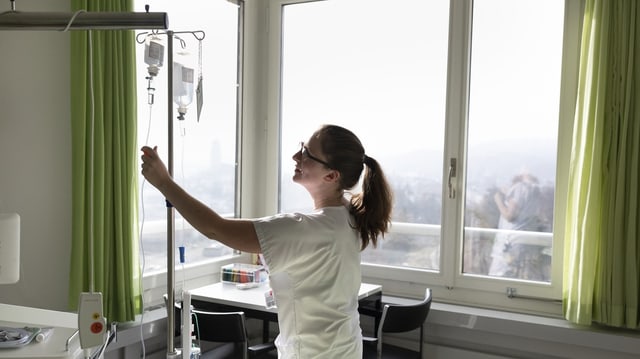Contents
There is talk of a loss of up to 300 million francs. If nothing changes, there is a risk of a drop in performance. Who is responsible?
The five Swiss university hospitals sound the alarm. They write high losses, as they disclose at a media conference on Tuesday.
Last year, the university hospitals recorded a total of minus 200 million francs. A loss of up to CHF 300 million is expected for 2023. The current tariffs would simply not cover the costs.
“We are literally up to our necks in water,” says Uwe E. Jocham, head of Insel Gruppe Bern, to SRF. And that in a phase where the hospitals would have to bear the investments in the future completely themselves. The additional shortage of staff means that you are in a “precarious situation”.
The university hospitals emphasize their importance for the healthcare system: They research, train, and provide a wide range of services for the general public. And that means additional costs.
University hospitals are demanding cost-covering tariffs
This special role of the university hospitals is to be taken into account in the ongoing revision of the ordinance on health insurance. “Otherwise, the fulfillment of the service mandates of our hospitals is in acute danger,” says Jocham.
Increase tariffs – that is the demand of the university hospitals in the current situation and after years of price reductions. Because without cost coverage, they are forced to terminate the existing collective agreements across the board at the end of 2023.
Health insurers fear unreasonable premium increases
The health insurance association Santésuisse recognizes the special services of the university hospitals, but they don’t want to know anything about higher tariffs at the moment. Director Verena Nold emphasizes: “In this year alone, healthcare costs have already risen by almost seven percent.”
The premium payers have to bear these costs, so a massive premium increase is indicated. “If you then have to pay higher rates for the university hospitals across the board, that would not be reasonable for the premium payers,” says Nold.
On the part of the university hospitals, one thing is certain: if there are no tariff increases, the cantons should give them financial support.
Cantons hold back
Lukas Engelberger sees things a little differently. For the president of the cantonal health directors, it is clear that you still have to start with the tariffs. “The law stipulates that hospital treatment, if it is provided efficiently and with high quality, must also be compensated to cover costs.”
Of course, price increases would be unpleasant, says Engelberger. However, one cannot refuse higher tariffs within the meaning of the supply mandate.
Engelberger warns: “A rescue package by the cantons would not be fair. That would mean that a few cantons that have these large hospitals would have to solve the financial problems in the healthcare system.”
Should the benefits possibly be reduced? Engelberger believes that cuts would not be accepted politically. “But at best shifts in performance are conceivable, i.e. that tasks are divided up differently among the hospitals.” However, that alone would not solve the financial problems.
University hospitals, health insurance companies and cantons: Their positions are still far apart. A hard fight is still expected to be found before a solution is found.

